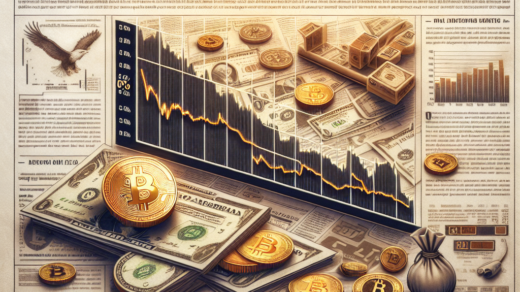U.S. Core Inflation Surges 0.3% in August: What It Means for Bitcoin and the Federal Reserve’s Rate Decision
In August, the core rate of the U.S. Consumer Price Index (CPI) rose unexpectedly, marking a significant development in the economic landscape. While the headline CPI figures met expectations, the core rate’s increase of 0.3% outpaced forecasts, stirring discussions about the Federal Reserve’s impending rate decisions. This article delves into the implications of rising inflation, its impact on Bitcoin prices, and what investors can anticipate from the Federal Reserve’s next meeting.
Understanding the Consumer Price Index (CPI)
The Consumer Price Index (CPI) is a vital economic indicator that measures the average change over time in the prices paid by urban consumers for a market basket of consumer goods and services. The core CPI excludes volatile items such as food and energy, providing a clearer view of underlying inflation trends. In August, the CPI rose 0.2%, aligning with expectations, while the year-over-year increase stood at 2.5%, slightly below the anticipated 2.6%.
Core CPI: A Closer Look
The core CPI’s rise of 0.3% in August is noteworthy given that it exceeded the forecast of 0.2%. Year-over-year, the core rate remained stable at 3.2%, consistent with previous months. This stability hints at persistent inflation pressures that could influence the Federal Reserve’s monetary policy.
The Federal Reserve’s Rate Decision: What to Expect
As inflation figures come in, market analysts are closely watching the Federal Reserve’s response. Investors had priced in a 71% chance that the Federal Reserve would reduce its benchmark fed funds rate by 25 basis points to a range of 5%-5.25% during its upcoming meeting. The recent inflation data is likely to solidify this expectation, especially given the core inflation’s stubborn persistence.
Fifteen minutes after the CPI release, the probability of a 25 basis point cut jumped to 85%. Furthermore, projections for potential rate cuts by year-end have increased, with a 14% chance of a total reduction of 75 basis points, up from 9% the previous day. This trend indicates that the Federal Reserve may lean towards a more cautious approach, focusing on gradual rate adjustments rather than aggressive cuts.
The Impact of Inflation on Bitcoin Prices
As inflation rises, traditional markets often react, and cryptocurrencies like Bitcoin (BTC) are no exception. Following the inflation report, Bitcoin’s price dipped by 1.5%, settling at $56,500. This reaction underscores the sensitivity of digital assets to macroeconomic indicators and monetary policy shifts.
For investors interested in Bitcoin, understanding how inflation influences market dynamics is crucial. As central banks respond to rising inflation, the implications for cryptocurrency prices can be significant. If you want to learn more about how to buy Bitcoin, visit our detailed guide on How to Buy Bitcoin.
Traditional Markets React to Inflation Data
The U.S. stock market has also felt the effects of the inflation report. Both the S&P 500 and Nasdaq indices saw a decline of 0.5% following the news. Meanwhile, the U.S. 10-year Treasury yield climbed by 3 basis points to 3.68%, and the dollar index rose by 0.15%. Such movements reflect investor sentiment and the broader economic outlook amid rising inflation.
Gold Prices and Inflation: A Comparative Analysis
Gold, often viewed as a hedge against inflation, experienced a slight dip of 0.45%, trading at $2,532 per ounce. This reaction is indicative of the ongoing battle between inflationary pressures and investor confidence in traditional safe-haven assets.
Conclusion: Preparing for Future Economic Conditions
As the Federal Reserve prepares for its next meeting, the implications of rising core inflation will undoubtedly shape its decisions. Investors should remain vigilant and consider how these economic indicators can impact their portfolios, especially in the volatile cryptocurrency market.
For those looking to diversify their investments, understanding various cryptocurrencies and their market behavior is essential. For insights into other digital currencies like Ethereum and XRP, check out our guides on How to Buy Ethereum and What is XRP.
In conclusion, staying informed about economic developments and their implications on both traditional and digital assets will be key for investors navigating these uncertain times. Be sure to follow our site for the latest updates and expert analyses on cryptocurrency trends.











